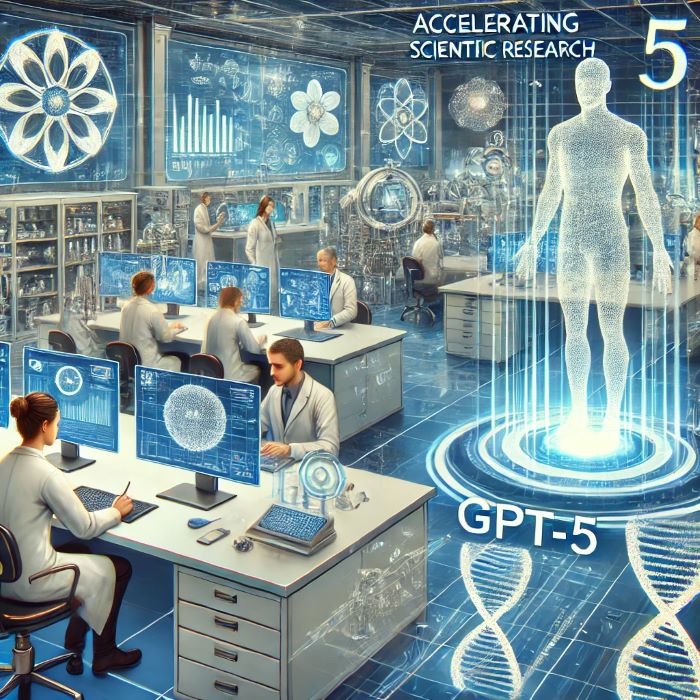GPT-5 in Scientific Research offers unprecedented capabilities in data analysis, hypothesis generation, and research design, accelerating discoveries and innovations across various fields. This article explores how GPT-5 in Scientific Research is transforming the landscape of scientific inquiry and its potential to revolutionize the way we conduct research.

Advanced Data Analysis
One of the most powerful applications of GPT-5 in Scientific Research is its ability to analyze vast datasets. Traditional data analysis methods can be time-consuming and require significant computational resources. However, GPT-5’s advanced algorithms can process and interpret large volumes of data quickly and accurately. This capability allows researchers to identify patterns and insights that may not be apparent through manual analysis.
For example, in the field of genomics, GPT-5 can analyze genetic sequences to identify mutations associated with specific diseases. This accelerates the discovery of potential targets for drug development and personalized medicine. Similarly, in climate science, GPT-5 can process extensive climate data to predict weather patterns and assess the impact of climate change.
Hypothesis Generation
The generation of hypotheses is a critical component of scientific research. GPT-5’s natural language processing capabilities enable it to generate innovative hypotheses by analyzing existing research literature and identifying gaps in knowledge. This can significantly reduce the time researchers spend on literature reviews and brainstorming sessions.
For instance, in cancer research, GPT-5 in Scientific Research can analyze existing studies to propose new hypotheses about the molecular mechanisms driving tumor growth. These hypotheses can then be tested experimentally, potentially leading to new therapeutic approaches. In physics, GPT-5 can suggest novel experiments to test theories about fundamental particles and forces.

Supporting Research Design
Designing robust research methodologies is essential for obtaining valid and reproducible results. GPT-5 in Scientific Research can assist researchers in developing experimental designs by analyzing prior studies and recommending best practices. This includes selecting appropriate control groups, determining sample sizes, and identifying potential confounding variables.
In clinical trials, for example, GPT-5 can help design studies that maximize statistical power while minimizing risks to participants. This ensures that trials are both ethical and scientifically sound. In engineering, GPT-5 can assist in designing experiments to test new materials or technologies, optimizing the use of resources and improving the reliability of results .
Interdisciplinary Applications
GPT-5 in Scientific Research is not limited to a single field; its applications span multiple disciplines. In social sciences, GPT-5 can analyze survey data to uncover trends in human behavior and social interactions. In neuroscience, it can process brain imaging data to identify neural correlates of cognitive functions.
Moreover, GPT-5’s ability to integrate data from different sources makes it an invaluable tool for interdisciplinary research. For example, in environmental science, GPT-5 can combine data from biology, chemistry, and geology to develop comprehensive models of ecosystem dynamics. This holistic approach can lead to a better understanding of complex environmental issues and inform conservation strategies.
Ethical Considerations and Responsible AI Use
While the benefits of GPT-5 in Scientific Research are substantial, it is crucial to address the ethical implications of its use. The potential for bias in AI-generated results and the need for transparency in AI decision-making processes are significant concerns. Researchers must ensure that GPT-5 is used responsibly, with careful consideration of ethical guidelines and regulatory requirements.
Additionally, the use of AI in research raises questions about data privacy and security. Ensuring that sensitive data is protected and that AI systems are used in compliance with privacy regulations is essential. This includes implementing robust data governance frameworks and regularly auditing AI systems to detect and mitigate potential biases.

Read more about ChatGpt 5
GPT-5 in Scientific Research is revolutionizing the way we conduct research, offering advanced tools for data analysis, hypothesis generation, and research design. By leveraging the capabilities of GPT-5, researchers can accelerate discoveries and drive innovations across various scientific fields. However, it is essential to use these powerful tools responsibly, considering ethical implications and ensuring data privacy. As we continue to explore the potential of GPT-5, its integration into scientific research promises to unlock new frontiers of knowledge and transform the landscape of scientific inquiry.
1. How does GPT-5 enhance data analysis in scientific research?
- GPT-5 in Scientific Research utilizes advanced algorithms to process and interpret large datasets quickly and accurately. This capability allows researchers to identify patterns and insights that may not be apparent through manual analysis, significantly improving the efficiency and accuracy of data-driven research.
2. Can GPT-5 generate hypotheses for scientific research?
- Yes, GPT-5 can generate innovative hypotheses by analyzing existing research literature and identifying gaps in knowledge. This AI-driven approach helps researchers formulate new hypotheses that can be tested experimentally, accelerating the discovery process.
3. How does GPT-5 support research design?
- GPT-5 in Scientific Research assists researchers in developing robust experimental designs by analyzing prior studies and recommending best practices. This includes selecting appropriate control groups, determining sample sizes, and identifying potential confounding variables, ensuring the validity and reproducibility of research results.
4. In which scientific disciplines can GPT-5 be applied?
- GPT-5 has broad applications across various scientific disciplines, including genomics, climate science, social sciences, neuroscience, and environmental science. Its ability to integrate data from different sources makes it an invaluable tool for interdisciplinary research.
5. What are the ethical considerations of using GPT-5 in scientific research?
- The ethical implications of using GPT-5 include potential biases in AI-generated results and the need for transparency in AI decision-making processes. Researchers must ensure responsible use by adhering to ethical guidelines, regulatory requirements, and robust data privacy and security frameworks.
6. How does GPT-5 ensure data privacy and security in research?
- Ensuring data privacy and security involves implementing robust data governance frameworks, regularly auditing AI systems to detect and mitigate biases, and complying with privacy regulations. This is crucial for protecting sensitive research data and maintaining ethical standards in scientific research.
- Resources: Learn R, Python & Data Science Online
